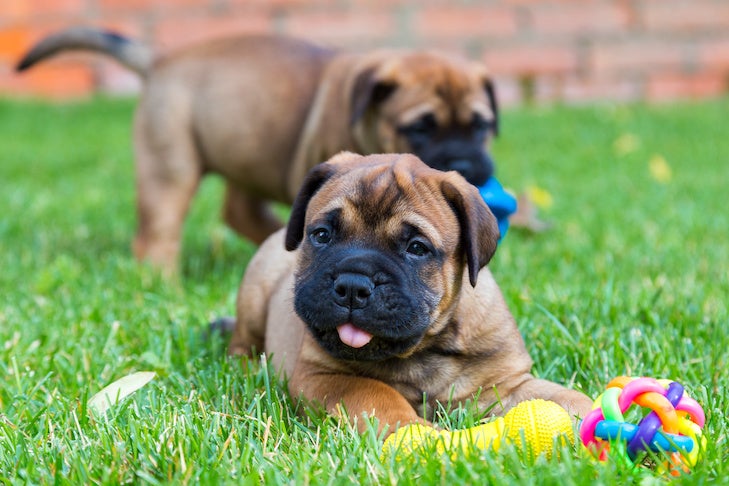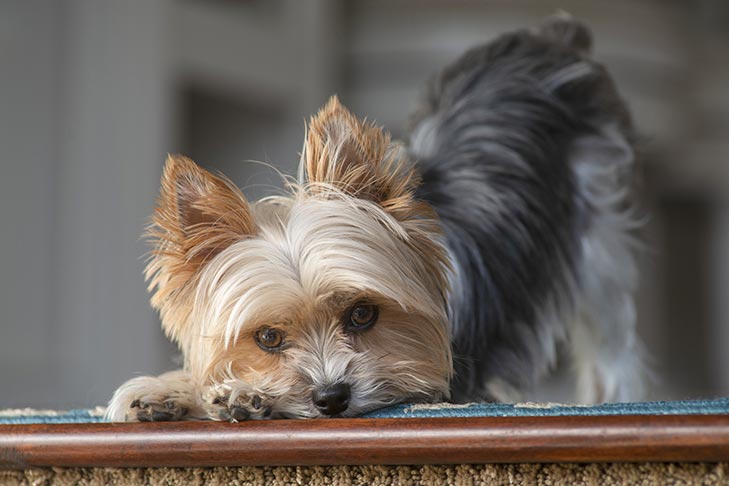Puppyhood is a lot like human childhood. There are phases and stages, and some youngsters seem to mature faster than others. We can set some parameters for puppies. For instance, as a rule, smaller dogs tend to mature more quickly than larger breeds. Small breeds reach their adult size at about 12 months old, while larger dogs may not reach physical maturity until they’re 18 to 24 months old.
But puppyhood encompasses more than just physical growth. You may see gradual changes that make you realize that your adorable little pup is now a grown dog. So, how long is puppyhood? Let’s look at a few different ways of defining it.
Breeds That Take Longer to Physically Mature
Not surprisingly, it’s the largest breeds that take the longest to grow to their adult size.
Bullmastiff
Bullmastiffs, which weigh in at 100 pounds or more at their adult size, don’t reach their mature weight and size until they’re two years old or more. The females of the slow-growing breed reach physical maturity at around 18 to 20 months, while Bullmastiff males may continue to grow and fill out for as long as three years in some cases. So basically you’re living with a strong-willed, powerful teenager in the house.

St. Bernard
Another of the large breeds, the Saint Bernard may not grow into their full adult size for two to three years. They’re considered one of the slowest breeds to physically mature. They also take longer than other breeds to mature mentally, so you can expect a super-sized puppy well into the first two years. After the first year, the big growth spurt slows down and plateaus until they reach their full size.
Great Pyrenees
The Great Pyrenees, which can top out at 100 pounds or more, is another slow grower. It takes a long time for your adorable, cuddly little ball of fluff to grow into their majestic, and powerful self. Most won’t grow to their full size until they’re two years old. Keep in mind that Pyrs are an independent-minded, strong-willed breed that may not be interested in taking orders. So start consistent training early, while they’re still a growing pup.
These are just a few of the large dog breeds that physically mature slowly. Most large and giant dogs will take a while to grow into their bodies and you can expect several months and up to a few years until your pup reaches their full weight and his muscles are fully developed.
Breeds That Take Longer to Mentally Mature
You know the type, the full-grown dogs that often act more like goofy toddlers than grownups. There are some dog breeds that never seem to really grow up.
Golden Retriever
We can probably all agree that the Golden Retriever is the prototypical Peter Pan of the dog world. If they could sing, “I Won’t Grow Up” would be their theme song. These happy, playful dogs keep their silly personalities and puppyish behavior well into adulthood and even into old age.

Labrador Retriever
Another retriever, the Labrador Retriever, is also known for a long puppyhood even as they grow to full physical maturity. Although they’ll reach their full height and muscle mass sometime between 12 months and two years old, their brain won’t catch up until they’re two to four years old. And, weighing in at somewhere between 55—80 pounds, that’s a lot of puppy exuberance.
Boxer
Then there’s the Boxer. Known as the “clown of the dog world,” their muscular, imposing physique belies a personality that’s playful, happy, and sometimes downright silly. The Boxer is always eager to play, especially with children. As smart as they are, the Boxer doesn’t always take training very seriously, which will also remind you that they’re a puppy at heart.
Bulldog
The Bulldog is an example of a breed that grows slowly both physically and mentally. It can take between 12 to 15 months for their body to fill out, and their bones continue to grow even up to 18 months. However, puppy behavior can last well into adulthood. Bulldogs are lifelong chewers and they’ll never turn down a good game of tug-of-war.
Breeds That Look Like Puppies Forever
Many of the toy breeds retain puppy looks their whole lives. Here are a few that both look–and sometimes act–like puppies.
Yorkshire Terrier
Weighing in at a mere seven pounds, the Yorkshire Terrier is an example of a breed that both looks and acts puppy-like well into maturity. The feisty little “tomboy toy” stays inquisitive, impish, and mischievous even as an adult. They can be both entertaining and stubborn, perhaps reminding you of toddlers you’ve known.

Shih Tzu
The sweet, wide-eyed, and trusting expression of a Shih Tzu is enough to melt any heart. The breed’s sole purpose in life is to be a companion and they’ve perfected the role. Not only do they retain their puppy appearance, but the Shih Tzu also stays playful and friendly their whole life.
Papillon
The Papillon is another toy breed that seems to stay young forever. Their unmistakable butterfly ears, silky coat, and alert expression contribute to a lifelong cuteness. These athletic little dogs also retain their playfulness and remain active well into adulthood.
Japanese Chin
The tiny Japanese Chin combines adorable puppy-like looks with a charmingly big personality. Some see them as almost more like a kitten than a puppy because the Chin can be either sweet or coy, depending on their mood. But they’re also entertainers and, like a proud toddler, they enjoy showing off their tricks to an adoring audience.
Do we measure puppyhood by a chart of ages and heights? By behavior and personality? By the elusive quality of staying cute? While any or all of these apply, perhaps the best measure is the day you look at your dog and realize they might just not be a puppy anymore, or that they’ll be a puppy for life.

